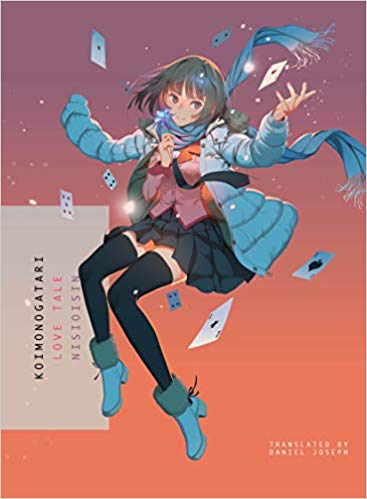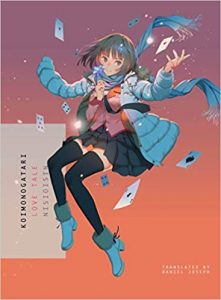By NISIOISIN and VOFAN. Released in Japan by Kodansha. Released in North America by Vertical, Inc. Translated by Daniel Joseph.
Most fans of the series over here have long been spoiled, of course, but I imagine it must have been irritating to some Japanese readers, who have been teased in past books that this book will have Senjogahara’s narration and thought processes, bought the book with Senjogahara on the cover and interstitials, opened it up, and had Kaiki telling them they’ve been duped. Yes, this Love Tale is being told by Kaiki, last seen with a beard and talking with Kanbaru about her problems. This takes place about six months before that, however, and is the story of Senjogahara hiring him to help with her own problem – Sengoku and her death threat. Her god powers have meant that Araragi and Shinobu are getting nowhere in this regard, and Kaiki has saved Senjogahara’s life before – horribly so. And so Kaiki sets up to deceive Sengoku, something that he thinks will be a piece of cake after talking with her for ten minutes. But is that all just a lie?
After the deadly dullness that was Shinobu’s narration last time, I’m pleased to say that Kaiki’s narrative voice is excellent. He plays at being an arrogant jerk, but the cracks show through constantly, so that’s fine. It’s also fun to see Araragi’s life and surrounding people from the perspective of an adult not connected to him – Kaiki finds a lot of Araragi’s antics disturbing, and there’s a running gag of everyone in the book referring to Shinobu using, well, a derogatory nickname, I’ll leave it at that. Kissshot sure has fallen far. I also like to see him confused at things that the reader will get – “Swear to cat” is a good example. His discussions with Senjogahara range from hilarious to touching, and you sense him shying away from the true feelings she had for him back two years prior. It’s disappointing that we don’t get her narration (in fact, spoilers, we never will, not even some 15-odd books later), but her fans should be pleased, as there are many scenes in the book showing off how far she’s come since Araragi first caught her nine months before.
Kaiki starts the book by claiming that a good deal of it is a lie, but of course he may be lying there as well. We do get a lot more insight into Sengoku’s personality and why she is the way she is, though I do think she’s not quite as infantilized and simple as Kaiki makes her out to be – if nothing else, he underestimates her at the end, though attributes that to her inability to let anyone get close to her. The description of her home life strikes an interesting comparison to Hanewkawa’s – something Kaiki himself does when he meets Hanekawa 2/3 through the book. And, as with my review of Onimonogatari, I will skip over the best part of the book, the climax where Kaiki breaks Sengoku but also convinces her to step down as a god. It’s magical. The book should end happily for most people, but since Kaiki is narrating, and he’s a self-proclaimed “villain”, there’s one last sting in the tale.
In the end, this is one of the strongest volumes in the Monogatari series, with lots of great jokes, tons of dense prose, and some keen insight into human nature, filtered through the voice of a man who insists that we take nothing at face value. Great stuff. Next time we’ll focus on Ononoki, who gets some small scenes here (and has a new character tic, something she lampshades).

